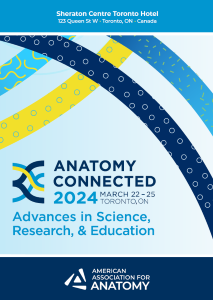Back
There are separate poster presentation times for odd and even posters.
Odd poster #s – first hour
Even poster #s – second hour
Co-authors:
Virtual Posters
Poster: Virtual Posters
Effects of traditional versus game review sessions with individual or team participation on medical student motivation and academic performance
Friday, March 22, 2024
12:00pm – 7:00pm US EDT
Location: Virtual
There are separate poster presentation times for odd and even posters.
Odd poster #s – first hour
Even poster #s – second hour
Co-authors:
Mark Terrell, Ed.D. - Lake Erie College of Osteopathic Medicine; Leah Labranche, Ph.D. - Lake Erie College of Osteopathic Medicine; Sarah McCarthy, Ph.D. - Lake Erie College of Osteopathic Medicine; Aladdin Abukabda, Ph.D. - Biosense Webster; Randy Kulesza, Ph.D. - Lake Erie College of Osteopathic Medicine

Caitlin N. Sachsenmeier, MS
Instructor of Anatomy/ PhD Candidate
Lake Erie College of Osteopathic Medicine
Erie, Pennsylvania, United States
Presenting Author(s)
Abstract Body : Introduction: Digital cooperative games for the purpose of learning have been shown to increase motivation and academic performance by meeting the needs of autonomy, competency, and relatedness. However, few studies explore the effects of using digital games in review sessions. To address this gap, we explored the effects of traditional versus digital game review sessions with individual or team participation on student motivation and academic performance. We hypothesized that students who participate in the game review session with team participation will have increased motivation and academic performance compared to those in a traditional review session or participating alone.
Methods: First year medical students enrolled in the LECOM Gross Anatomy course were recruited to participate in a review session. Participants completed a demographic survey and the Motivated Strategies for Learning Questionnaire (MSLQ), which assessed six different subcategories: intrinsic goal, extrinsic goal, task value, learning belief, self-efficacy, and test anxiety. The students were randomly sorted into one of four groups: traditional review session with either individual (TI) or team participation (TT), or digital game review session with either individual (GI) or team participation (GT). The traditional session reviewed 50 multiple choice questions on a timed PowerPoint. The game review session involved a digital escape room that was solved by answering the same 50 questions. The students took a pretest, participated in their assigned review session, then took a posttest and the MSLQ again. A post activity survey was administered to gauge participant perceptions of their respective review session.
Results: There was a significant increase in test score for the GI group. The TT and GT groups had a significant increase in intrinsic goal scores. The self-efficacy scores significantly increased only for the GT group. Students in the TT, GI, and GT groups rated their respective sessions significantly higher in keeping their interest compared to the TI group.
Conclusion: Our hypothesis was supported by the findings that two aspects of motivation significantly increased after students participated in the GT group. Our hypothesis was partially supported with the GI group having a significant increase in test score, showing that the game itself influenced academic performance. The team and game aspect held the students’ interest throughout the review session.
Significance: Digital gamified review sessions may be an effective way to integrate games into anatomy education and are more effective than traditional methods in improving student academic performance and motivation.
Methods: First year medical students enrolled in the LECOM Gross Anatomy course were recruited to participate in a review session. Participants completed a demographic survey and the Motivated Strategies for Learning Questionnaire (MSLQ), which assessed six different subcategories: intrinsic goal, extrinsic goal, task value, learning belief, self-efficacy, and test anxiety. The students were randomly sorted into one of four groups: traditional review session with either individual (TI) or team participation (TT), or digital game review session with either individual (GI) or team participation (GT). The traditional session reviewed 50 multiple choice questions on a timed PowerPoint. The game review session involved a digital escape room that was solved by answering the same 50 questions. The students took a pretest, participated in their assigned review session, then took a posttest and the MSLQ again. A post activity survey was administered to gauge participant perceptions of their respective review session.
Results: There was a significant increase in test score for the GI group. The TT and GT groups had a significant increase in intrinsic goal scores. The self-efficacy scores significantly increased only for the GT group. Students in the TT, GI, and GT groups rated their respective sessions significantly higher in keeping their interest compared to the TI group.
Conclusion: Our hypothesis was supported by the findings that two aspects of motivation significantly increased after students participated in the GT group. Our hypothesis was partially supported with the GI group having a significant increase in test score, showing that the game itself influenced academic performance. The team and game aspect held the students’ interest throughout the review session.
Significance: Digital gamified review sessions may be an effective way to integrate games into anatomy education and are more effective than traditional methods in improving student academic performance and motivation.

